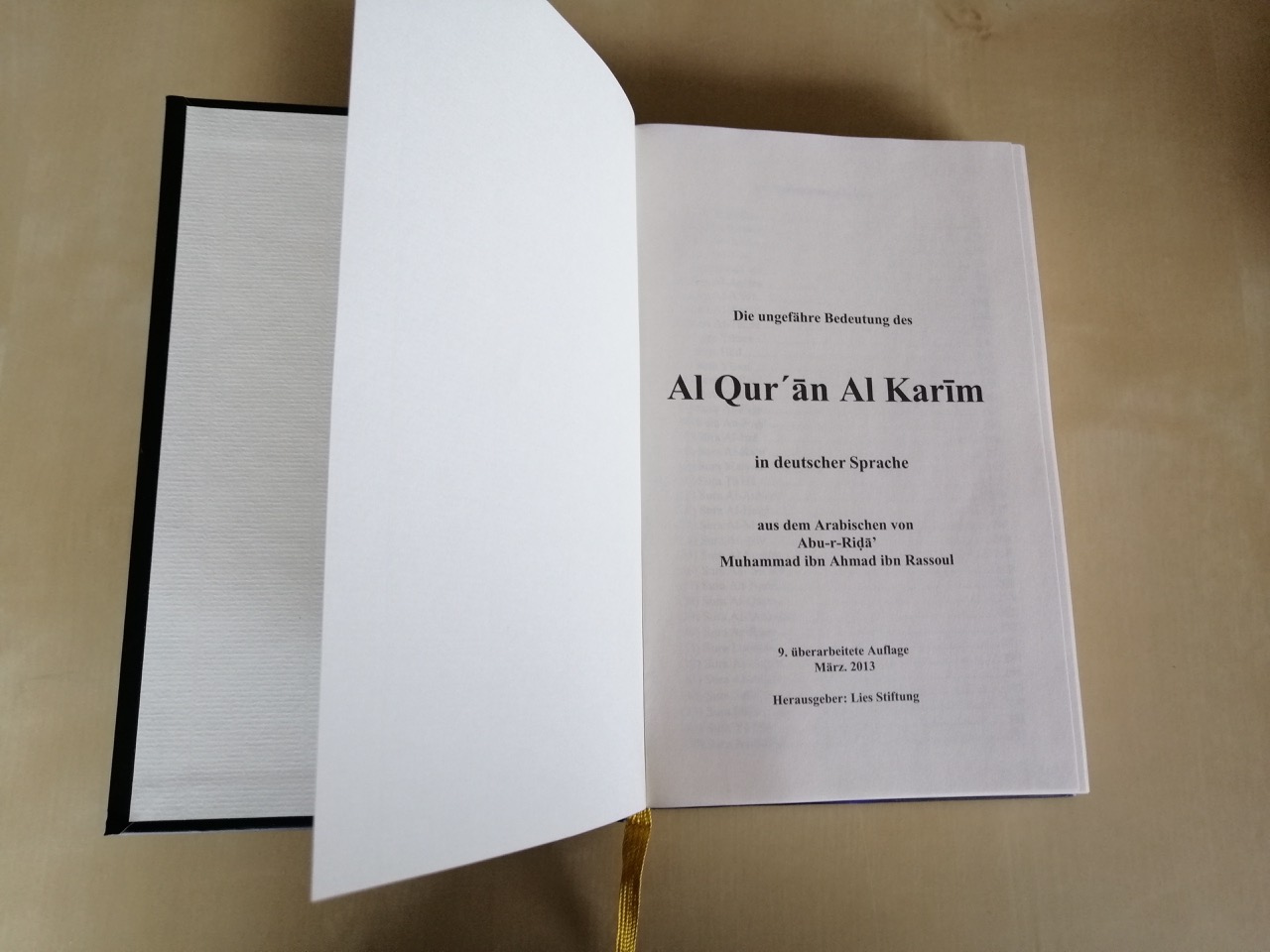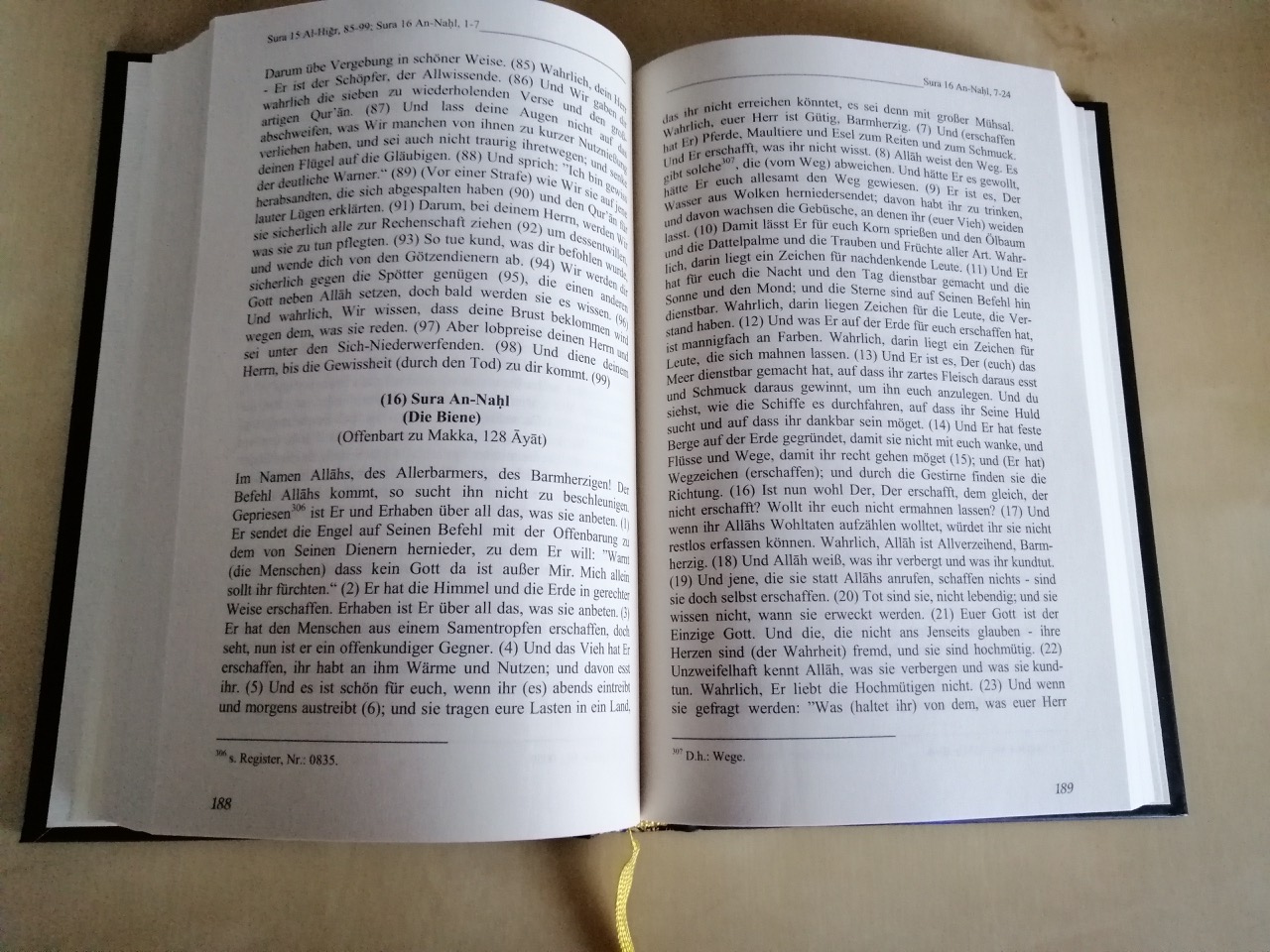This book, entitled “The Approximate Meaning of Al Qur’ān Al Karīm in German Language” („Die ungefähre Bedeutung des Al Qur’ān Al Karīm in deutscher Sprache”), is the most politicized Qur’an translation in German history. Originally published by the Egyptian-born Muhammad Rassoul (1929–2015) in 1986 in a bilingual edition, it was distributed in a monolingual German version in large numbers between 2011 and 2016 by a Salafi campaign called “Lies!” (pronounced as “lease”), which means “Read!” and is a translation of the Arabic “Iqraʾ”, assumed by many Muslim exegetes to be the first word of the Qur’anic revelation, chronologically.
The Lies! campaign was run by Ibrahim Abou Nagie, a Palestinian-born Salafi preacher whose declared aim it was to save non-Muslim Germans from hellfire by ensuring that every German-speaking household received their own copy of the Qur’an. It was also an attempt to unite the fragmented Salafi scene and win new adherents. This was mostly achieved by distributing Rassoul’s Qur’an translation in city centres, accompanied by no other da’wah material that might have alienated non-Muslim Germans. After a few years, due to the rise of the “Islamic State”, which attracted about one thousand Germans who travelled to Syria, sensitivity towards Salafi da’wah activities rose considerably. Abou-Nagie’s association “The true religion” was banned in 2016 and the Qur’an distribution campaign came to a halt. Abou Nagie claimed to have distributed several hundred thousand copies, funded by small donations from German Muslims. By buying one copy of the Qur’an translation, they could fund an additional one for distribution to non-Muslims.
Abou Nagie consciously chose to print a Qur’an translation that was widely known and popular among German Muslims, rather than a specifically Salafi work. Muhammad Rassoul’s translation can be found in most German mosques. Rassoul himself might have been the most prolific author and publisher of Islamic literature in German, including the controversial book “The German Caliphate”. He claimed that his “Approximate Meaning” was the first German Qur’an translation ever written by a Muslim. This is only accurate when one excludes the translations by the two Ahmadiyya movements, however, which date to the 1930s and 1950s.
Just like the title, many of the translator’s choices cater to pious sensitivities and signal Islamicity: “Allāh” instead of “God”, “Qur’ān” instead of “Koran”, Arabic terms such as Ǧaḥannam and the (inconsistent) use of Arabic names such as Yūsuf and Yaḥyā. While Rassoul sought to distance himself from the German Orientalist tradition of Qur’an translation, he was clearly indebted to some of its translators, especially Max Henning (1861–1927). There are also traces of Rudi Paret’s (1901–1983) translation as well as those of the Ahmadiyya movements to be found in Rassoul’s work.
His translation is conservative and based on the tradition of Sunni Qur’anic exegesis, without much interest in philological detail. For example, the gender-neutral Arabic zawǧ is translated as “wife” (Q. 4:1). The style of the translation is cumbersome and sometimes awkward but, all in all, the German is fluent, comprehensible and not overburdened with Arabic terminology. This, alongside the author’s Sunni, non-Orientalist credentials, ensured its popularity in mosques, on the internet and in Qur’an apps. Those might actually be much more readable than the grouped-style Lies! edition.
The remainders of that edition, around 20.000 copies, were seized when the group was banned in 2016. Until this day, the German authorities have no idea what to do with them. Destroying large numbers of Qur’an translations does not seem to be a good option to them, but nor do they want to distribute printed material produced by a banned Salafi organization. For the time being, the books are stored in a military facility.
Johanna Pink



